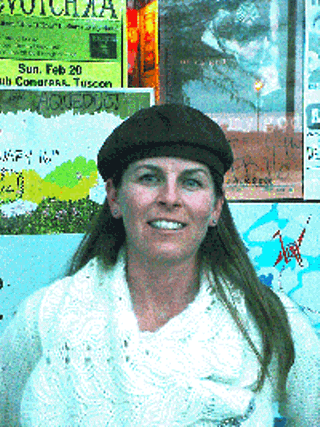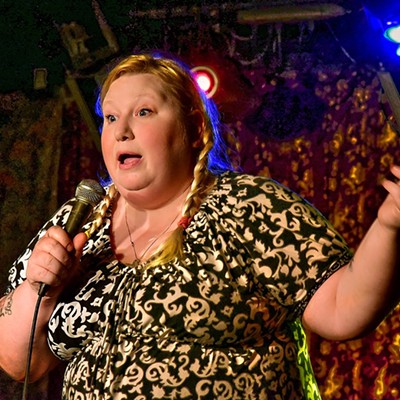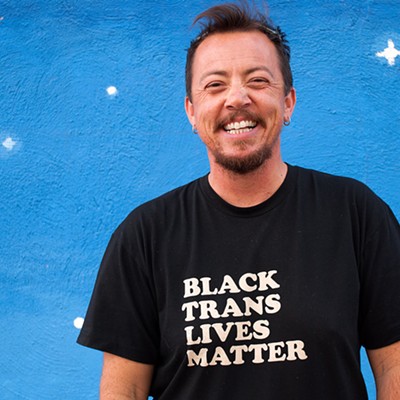"We need something like Tucson Originals for the arts," she says, referring to the consortium of locally owned restaurants united in self- and cross-promotion. "I've gone to Barrio and they've said, 'We're full; why don't you try Kingfisher?' The arts groups here need to be more like that: Stop worrying about competing with each other for ticket buyers and grants, and find a way to be more collaborative and supportive without giving up their individuality and missions."
Macarty says she has seen the local poetry community, at least, draw closer together during the 14 years she's been in Tucson. (She came to enroll in the MFA program at the University of Arizona.)
In 1981, she says, Clint Colby, Jim Fitzgerald, John Hudak and Will Inman concocted the Tucson Poetry Festival as a distinct alternative to the UA's various poetry efforts, including the Poetry Center. "I don't see that distinction as being significant anymore," she says. "Cooperation and collaboration are much more important now than competition and creating alternatives."
While she agrees that it's exciting and enriching for various organizations to maintain their aesthetic differences, "trying to hold one organization above another only hurts both organizations and turns the community off."
The Tucson Poetry Festival, which now has spring and autumn components, is billed as an annual celebration that "includes emerging and established poets who represent the diverse and eclectic writing approaches of contemporary poetry today" with readings, workshops and slams. It's ironic, though, that a festival venturing into the wild world beyond the academy has been run from its inception by people holding MFAs like Hudak, then Karen Falkenstrom, and for the past 11 years Macarty.
So the outgoing executive director is delighted to hand her keys over to Teresa Driver. "She has a degree," says Macarty, "but she's not a product of the MFA program. She has roots more in the street poets, the community-at-large poets. That's a positive thing."
Macarty has a reputation around town for operating and publicizing the festival with a steely single-mindedness, which has burned out volunteers and led to grumbling that she uses the festival to promote her own career.
"If that were true," she counters, "I'd have a lot more poems published by now, maybe even a book, if the poetry gods were willing. My interest has never been to promote myself, but to promote poetry--to be of service to the community by bringing poetry to the people."
Perhaps one thing that irks her critics is that for the past five years, she's been able to draw a salary as executive director of the Tucson Poetry Festival. But that happened almost by accident, she says.
At a friend's party a few years ago, she met a philanthropist, now deceased, she identifies as "one of the Rockefeller brothers." (Macarty speaks with the precise diction and polysyllabic vocabulary of the well-educated, and admits to hailing from New Hampshire; it's not hard to imagine her being two degrees of separation from the Rockefellers.) Macarty, who also teaches various forms of movement, fell into a conversation with the philanthropist about one of his great pleasures, yoga. The philanthropist took a personal interest in her, and invited her to present him a grant proposal for the festival.
As a result, she landed a generous five-year grant. How much? "A lot," is all she'll say. "It was enough for me to justify the amount of time I was spending on the festival."
Macarty admits that she had no idea how to run a nonprofit organization a decade ago, but she proudly declares that, thanks not only to her work but also that of the volunteers and the "very capable, very artistic" board of directors, the Tucson Poetry Festival is now in better shape than ever.
"A lot of the infrastructure is stabilized now," she says. "It's almost less interesting to me now, because it kind of runs itself. I feel like I brought the festival to a threshold that it's ready to cross now that I'm leaving."
The festival is now one component of a corporation called Ocotillo Literary Endeavors (the acronym is pronounced "olé"), of which Macarty is board president. "The umbrella organization presents several different events that will feed off each other to build an audience for contemporary poetry," she says.
The local poetry audience is both a joy and a frustration to Macarty. "I don't know of another place in the country with such poetry density--so many poets of note, and poetry lovers, per capita," she says. Yet getting them to poetry events isn't easy.
"When I do an event," she says, "I see who's not there, and I wonder why not. Aesthetic interest in a performer is not the only reason to go. It's important to keep the organization alive, to show support, by buying a ticket. And if we're not doing what they want, I wish they'd pipe up and tell us what they'd prefer--in a constructive letter, with an offer to help--instead of this silence."
This is why half the Poetry Festival is moving from April--as National Poetry Month, it's getting too crowded with competing literary events--and into October. This year's events explore poetry's connections with painting, the halfway point in a five-year program examining poetry's relation to other arts. Macarty catches herself when she starts talking as if she'll be around for the rest of the series.
"I can't quite stop," she admits, with only three weeks until she leaves for Vancouver. "I'm not the sort of person who can honor the boundary of when my time is done here."











